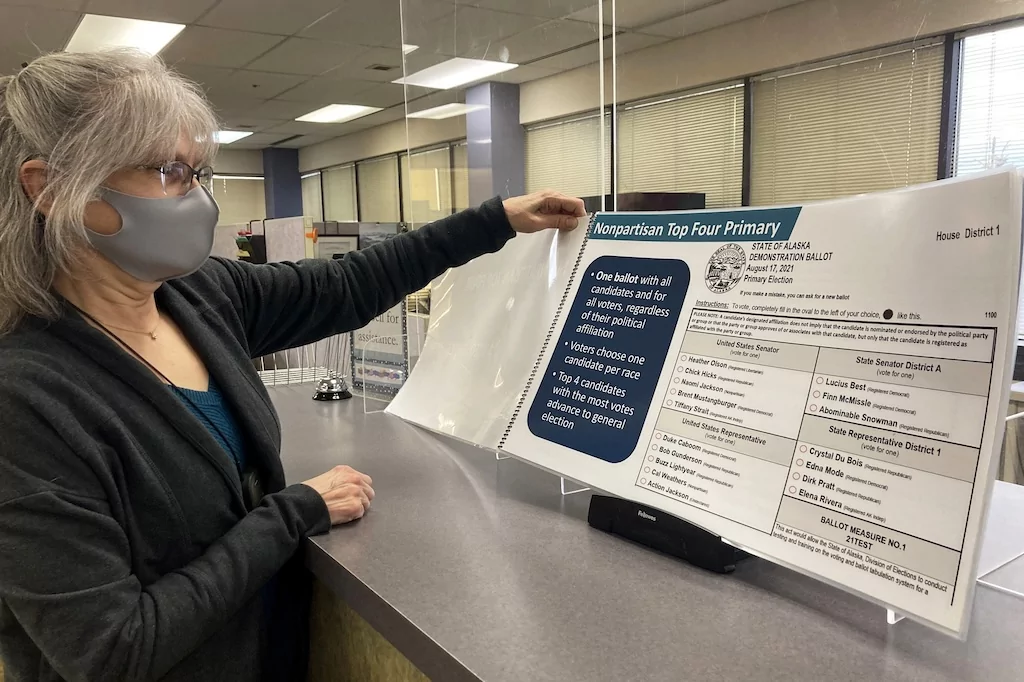

Alaska is one of a few states that has ranked choice voting as part of its elections, but a ballot measure in November could change that.
In 2020, voters narrowly passed Ballot Measure 2, which instituted a nonpartisan top-four primary and ranked choice general election, but in 2024 a different Ballot Measure 2 would essentially repeal the 2020 Ballot Measure 2, by reverting the state back to a party primary process and normal general election.
The current system allows voters to cast their ballots in order of preference between the candidates. If a candidate fails to receive 50% on the first ballot, then the voters from the candidate with the least votes that round are reallocated to their next preference on their ballot, until one candidate has received 50%. If a voter only picks one candidate, then their vote is not reallocated if that candidate is eliminated.
Ranked choice voting has seen an uptick in adoption in recent years, but Alaska’s use of the system has been one of the most visible uses of it in consequential elections.
The system was first used in the state for the 2022 elections, leading to Democrat Mary Peltola flipping the longtime GOP-held at-large House seat for the state. The result came from two Republicans splitting the vote, and Republican Sarah Palin was unable to acquire enough voters from fellow Republican Nick Begich’s voters in the final round.
The result, which saw 49.07% of voters cast their ballot for Republican candidates compared to the 48.77% for Peltola, the lone Democrat, increased criticism of the voting system. Opponents of ranked choice voting have claimed that it is confusing process and pressures voters to rank candidates they would not typically vote for.
One of the leading groups arguing against ranked choice voting is Stop RCV.
The group warns that rank choice voting makes elections harder for voters and election administrators, along with hurting transparency and accountability with elections.
“An RCV ballot is also longer and takes more time for voters to complete. This means more delays and longer lines at polling places. It also creates many new opportunities to make a mistake, increasing the chances that a voter’s intent is not correctly recorded or that ballots are disqualified and discarded,” the group warns on its website.
With Alaska, Jason Snead, executive director of the Honest Elections Project, which is part of the Stop RCV coalition, finds it unsurprising there is a push to reverse the 2020 change to ranked choice voting.
“RCV takes elections in the wrong direction, and so it’s no surprise that after using it once, Alaskans are pushing to get rid of it. There’s a long history of voters trying and rejecting RCV,” Snead said in a statement.
Proponents of ranked choice voting still maintain that the system puts power back in voters’ hands, by noting that most voters are not registered to a party. The main group backing the ranked choice voting system has been Alaskans for Better Elections.
“Our new voting system gives every Alaskan the freedom to vote for the any candidate they want. These reforms help unrig our political system and put power and freedom back in the hands of the voters,” the group claims on its website.
After the first use of ranked choice voting in an election, with the 2022 special election for the state’s ranked choice voting, the group pointed to a poll conducted at the time which showed 85% of voters said the process was simple.
CLICK HERE TO READ MORE FROM THE WASHINGTON EXAMINER
The Alaska Supreme Court cleared the way for the 2024 Ballot Measure 2 to appear before voters, upholding a lower court ruling that allows it to stay on the ballot.
When Alaska voters go to the polls on Nov. 5 to decide on the fate of ranked choice voting, the hotly contested House race may be less dividing than in 2022. Third-place primary finisher Republican Nancy Dahlstrom announced she would drop out of the general election, allowing for a more head-to-head matchup between Peltola, the Democrat, and Begich, the Republican.







